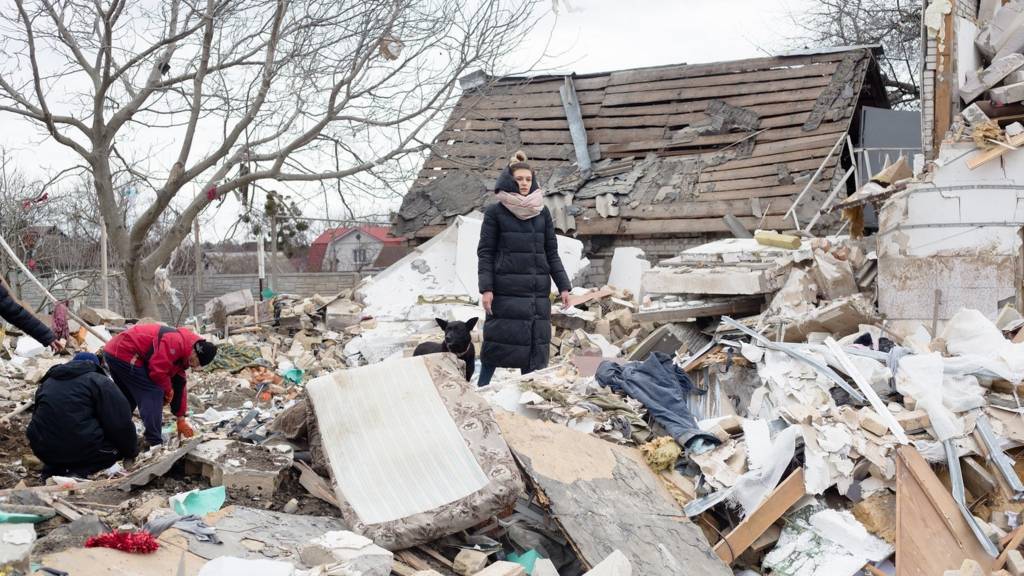
As it happened: Russia continues full-scale attacks as residents trapped
Updates from BBC correspondents in Ukraine and the region: Orla Guerin, Lyse Doucet and James Waterhouse in Kyiv, Sarah Rainsford in Dnipro and Fergal Keane and Joel Gunter in Lviv
Related Video and Audio
RTL




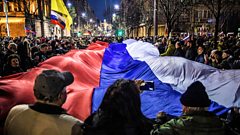
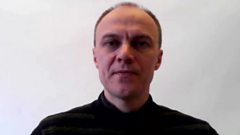

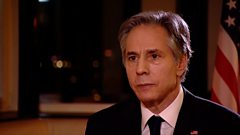
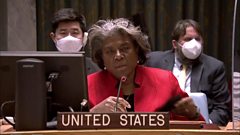
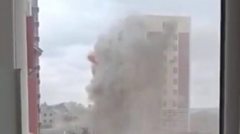
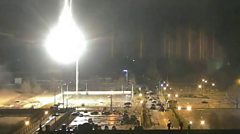
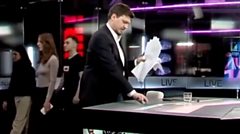


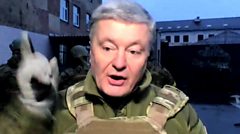



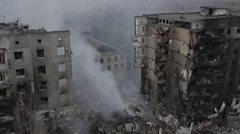
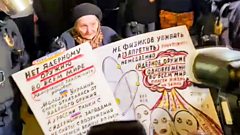
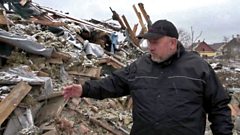
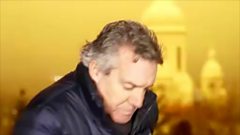



Live Reporting
Edited by Jessica Murphy
All times stated are UK
Get involved

Getty ImagesCopyright: Getty Images Video caption: Ukraine invasion: Anti-war protests held across EuropeUkraine invasion: Anti-war protests held across Europe 
BBCCopyright: BBC 
Getty ImagesCopyright: Getty Images 
BBCCopyright: BBC 
Getty ImagesCopyright: Getty Images 
Getty ImagesCopyright: Getty Images 
Volodymyr Zelensky's officeCopyright: Volodymyr Zelensky's office 
BBCCopyright: BBC - How reliant is Europe on Russia for oil and gas?
View more on twitterView more on twitter 
Getty ImagesCopyright: Getty Images 
Getty ImagesCopyright: Getty Images 
Anadolu Agency via Getty ImagesCopyright: Anadolu Agency via Getty Images People fleeing Ukraine continue to arrive in neighbouring PolandImage caption: People fleeing Ukraine continue to arrive in neighbouring Poland -
Russian forces continued to shell the Ukrainian city of Mariupol despite agreeing to a ceasefire - throwing an attempted mass evacuation of civilians into chaos. Just hours after the ceasefire was supposed to begin, Mariupol authorities announced they had postponed the evacuation because of the continued bombardment
-
Russian President Vladimir Putin warned that any attempt to impose a no-fly zone over Ukraine would be seen as participation in the armed conflict
-
In the Black Sea port of Kherson, the first Ukrainian city to fall to the Russians, some 2,000 residents held protests against the occupiers
-
Prada, Zara, Paypal and Samsung became the latest international firms to suspend trading in Russia

BBCCopyright: BBC 

AFPCopyright: AFP Pro-Ukraine supporters have been gathering outside the White HouseImage caption: Pro-Ukraine supporters have been gathering outside the White House 
Getty ImagesCopyright: Getty Images The Italian fashion group Prada says it is suspending all retail operations in RussiaImage caption: The Italian fashion group Prada says it is suspending all retail operations in Russia Analysis
Getty ImagesCopyright: Getty Images -
Download the Psiphon app from the AppStore or Google Play Store
-
Look for the dedicated BBC site on the Tor Browser which can be found using this URL. Note that this URL only works using the Tor Browser or the Onion Browser (on iPhones)
-
If access to the apps is restricted then send a blank email to get@psiphon3.com or gettor@torproject.org. An email will be sent in response with a direct and safe download link
-
15735 kHz from 14:00 GMT to 16:00 GMT
-
5875 kHz from 20:00 GMT to 22:00 GMT

BBCCopyright: BBC
Latest PostContinue to follow our live coverage
For technical reasons, we will be switching out live coverage to a new webpage.
You can continue to follow our around the clock coverage of the war in Ukraine at this link here.
Biden seeks additional Ukraine funding from Congress
US President Joe Biden has said his administration is working closely with Congress to secure additional funding for Ukraine.
Biden made the statement during a phone call with his Ukrainian counterpart Volodymyr Zelensky on Saturday. The US president reiterated his support for Ukraine and praised the skill and bravery of its citizens and troops.
A White House readout from the call made no mention of Zelensky's repeated requests for assistance in setting up a no-fly zone over Ukraine.
The US and other Nato nations have rejected such requests over concerns it could escalate the conflict.
Instead they have focused on imposing severe economic sanctions on Russia and some of its wealthiest people.
They have also been providing military, medical and humanitarian aid to Ukraine.
WATCH: Anti-war protests held across Europe
From Rome to Munich to London, people gathered today to oppose Russia's invasion of Ukraine.
It's the second weekend in a row that people have protested in cities around the world to show their support for Ukraine.
Watch to see where the demonstrations took place.
Video content
Canada raises travel risk for Russia
Canada's foreign ministry is urging Canadians to avoid all travel to Russia, and has told Canadian citizens there that they "should leave while commercial means are still available".
It told citizens that if they stayed, they could face "shortages of essential products and services" and "may not be able to use your banking cards for payment or to withdraw funds".
It also warned that those who remain in Russia should "not depend on the Government of Canada to help you leave the country".
Earlier today, the US State Department issued a similar advisory, telling citizens there to depart immediately.
The UK Foreign Office has also told Britons whose presence in Russia is "not essential" that they are strongly advised to consider leaving by currently available commercial routes.
Mariupol in 'very difficult stage' of siege
The mayor of Mariupol says Russian forces have intensified shelling in the Ukrainian city.
Vadym Boychenko said the port city was in “a very, very difficult state of siege”.
“Relentless shelling of residential blocks is ongoing, airplanes have been dropping bombs on residential areas,” the AP news agency quoted him as saying.
He added that residents, including women and children, came under fire as they tried to leave the city.
The port city has been witnessing intense shelling for days as Russian troops have been trying to cut Ukraine off from this strategically important sea link.
Russian forces have continued to shell Mariupol despite agreeing to a ceasefire, throwing an attempted mass evacuation of civilians into chaos.
You can read more about that here
Zelensky speaks with US President Biden and Israel's Bennett
Ukrainian President Volodymyr Zelensky spoke with US President Joe Biden today.
"As part of the constant dialogue, I had another conversation with @POTUS," Zelensky wrote on Twitter. "The agenda included the issues of security, financial support for Ukraine and the continuation of sanctions against Russia."
Zelensky also spoke with Israel's Prime Minister Naftali Bennett, shortly after Bennett's three-hour meeting with Vladimir Putin in Moscow.
Although Israel is a key ally of the US, Bennett has tried to preserve a good relationship with Russia. Israel, at the request of Zelensky, has offered to mediate in the conflict between Russia and Ukraine.
Residents of occupied Ukrainian city stage protest
In the Black Sea port of Kherson - the only large city to have fallen to the Russian army so far - people have been protesting the Russian invasion.
On Friday, some residents snubbed Moscow's distribution of humanitarian aim, chanting patriotic slogans and waving Ukrainian flags.
"It was thousands of people, not hundreds," one man who attended the protests told the BBC. The BBC has withheld his name for security reasons.
"We chanted that Kherson is Ukraine," he told BBC's Newshour. "People shouted at Russia's military, 'Go home, we don't want you here. We want to live in Ukraine, we want to live with Europe, not with Russia.'"
The man confirmed reports that Russian shoulders fired guns into the air to deter protesters.
He said residents do currently have electricity and limited internet.
"We are just living from day-to-day," the man said. "It's still some scary times."
Ukraine hospitals facing critical shortages
Hospitals across Ukraine are facing threats of supply shortages as the number of wounded grows, said Alex Wade, an emergency co-ordinator with Médecins Sans Frontières (MSF) to the BBC.
"The situation is incredibly worrying and is certainly getting more worrying by the day," Wade said on BBC's Newshour earlier today. "There are ruptures in what hospitals need to support their patients."
In some cases medical aid has been stymied by the advancing Russian invasion. Some towns - like port city Mariupol - have been cut off from both power and critical interventions from aid agencies like MSF.
"We are no longer able to communicate with the hospital [in Mariupol]," Wade said. "And we're very concerned we will lose access to supplying more hospitals in the coming days."
Ukraine people will be our judge - Johnson
UK Prime Minister Boris Johnson has called for a renewed effort among world leaders to ensure that Russia's invasion of Ukraine fails.
Writing in the New York Times, Johnson set out a six-point plan, including rapidly strengthening defences in Nato countries.
"Putin must fail and must be seen to fail in this act of aggression," he wrote. "It is not future historians but the people of Ukraine who will be our judge."
The UK's Labour Party has criticised the prime minister for not acting more quickly with sanctions.
Johnson is expected to repeat his pitch to fellow Western leaders this week.
He will be meeting with Canadian Prime Minister Justin Trudeau and Dutch Prime Minister Mark Rutte on Monday and hosting leaders from the Czech Republic, Hungary, Poland and Slovakia the following day.
Read more about Johnson's plea for Ukraine.
Elon Musk to supply Ukraine with more Starlink terminals
Ukrainian President Volodymyr Zelenskiy said today that he had spoken to SpaceX CEO Elon Musk and announced the country will receive more of its Starlink satellite internet terminals this coming week.
"Talked to @elonmusk," Zelensky wrote on Twitter. "I’m grateful to him for supporting Ukraine with words and deeds. Next week we will receive another batch of Starlink systems for destroyed cities. Discussed possible space projects. But I’ll talk about this after the war."
Starlink provides high-speed internet from space with satellites flying in low Earth orbit.
Musk said on Thursday that the system was the only non-Russian communications system still working in some parts of Ukraine in the wake of Russia's invasion.
Meanwhile, in an address to the Ukrainian people on Saturday night, Zelensky urged citizens in Russian occupied areas of the country to fight back against Vladimir Putin's military.
“Ukrainians! In all of our cities, where the enemy invaded, go on the offensive. Go out on the streets. We need to fight every time we have an opportunity,” he said.
'I don't want this, why should we die?'
Tim Franks
BBC Newshour, Lviv
Fourteen-year-old Mariana is about to add herself to the more than one million people who’ve fled over the border.
She’s at Lviv station in Ukraine with her younger sister and aunt, hoping to board a train to Poland.
It’s been an exhausting two-day trek from her home in Kharkiv, in the north-east.
She’s left her parents and her grandparents behind. And Mariana can barely speak for the tears. “I’m scared,” she sobs.
“My parents stayed. I really want to see them. I don’t want to go to Poland.”
Her grandparents were too frail to leave home. But that home has become unrecognisable. Which is why Mariana’s mother and father made their agonising decision to part from their children.
They’d spent days cowering, hungry and terrified in a basement as the bombardment closed in.
“I don’t want this,” Mariana pleads. “Please stop this. Why should we die?”
US congressman: Ban on Russian oil is first priority
A US ban on Russian oil will be the first priority for lawmakers, Congressman Mike Quigley told CNN a short while ago.
"The first thing you'll see Congress push for is an embargo," he said, noting that around 8% of US oil imports are from Russia.
An embargo would be "traumatic for our European allies", who are more dependent, the Illinois Democrat said. "So that's going to take quite a bit of diplomacy."
His comments come after Ukrainian President Volodymyr Zelensky spoke with Quigley and more than 300 of his colleagues, calling for a bar on the import of Russian oil.
A ban on Russian oil has provided a rare moment of bipartisan co-operation in the US Congress - both Republican and Democratic lawmakers have publicly pressured the Biden administration to implement an embargo.
The US is one of the world's biggest oil producers, whereas the EU relies on imports to meet 61% of its energy needs.
Shell makes 'difficult decision' to buy Russian oil
Shell said today that it made the "difficult decision" to purchase a cargo of Russian crude oil to ensure a continued supply of energy to the European market.
"Cargos from alternative sources would not have arrived in time to avoid disruptions to market supply," the oil giant said in a statement.
It said the firm is facing challenges in shifting from Russian oil "because of how significant [it] is to global supply".
Shell said it would commit profits from its "limited amount of Russian oil" to a dedicated fund going towards humanitarian aid in Ukraine.
Shell said earlier this week it will end all of its joint ventures with the Russian energy company Gazprom due to Russia's invasion of Ukraine.
It said it will also sell its 50% stake in two Siberian oilfield projects.
Russian oil exports account for about 8% of global supply. There has been a growing push in recent days for countries to shun Russian oil and gas - a move currently being considered by the United States.
Visa and Mastercard pull out of Russian market
The payments giants Mastercard and Visa have announced that they are suspending their operations in Russia in protest over the invasion of Ukraine.
In a statement, Mastercard said that Russian banks would no longer be supported by its network and any card issued by the company outside of country would not work at Russian merchants or ATMs.
The company said it had listened to representations from partners and taken its decision due to the "unprecedented nature of the current conflict and the uncertain economic environment".
Meanwhile, Visa said that it would work to cease all transactions in the country in the coming days, adding that Visa cards issued by financial institutions outside of Russia would also stop working in the country' territory.
Al Kelly, Visa's CEO and chairman, said the company had been "compelled to act following Russia’s unprovoked invasion of Ukraine, and the unacceptable events that we have witnessed".
“We regret the impact this will have on our valued colleagues, and on the clients, partners, merchants and cardholders we serve in Russia. This war and the ongoing threat to peace and stability demand we respond in line with our values,” he concluded.
Chelsea coach criticises fans for singing Abramovich's name
Taking a step away from the developments on the battlefield in Ukraine for moment, let's look briefly at some news from the football pitch.
Head coach of Premiere League football club Chelsea, Thomas Tuchel, has criticised the club's supporters who sang owner Roman Abramovich's name during a minute's applause for Ukraine before their 4-0 win over Burnley today.
On Wednesday Abramovich announced his decision to sell the club amid heavy scrutiny following Russia's invasion of Ukraine. He's alleged to have strong ties to Russian President Vladimir Putin, which he has denied.
Some Chelsea fans chanted Russian Abramovich's name throughout the game, and were booed by Burnley fans.
"It's not the moment to do this," Chelsea manager Tuchel said. "If we show solidarity we show solidarity and we should do it together."
Read more here
Day 10 of Ukraine conflict explained
The conflict in Ukraine is well into its second week - here's a look at what's happened today:
Here is your full guide to understanding day 10.
Zelensky asks US lawmakers for help getting weapons
David Willis
BBC News, Washington
Ukraine’s President Volodymyr Zelensky has repeated a call for a no-fly zone over his country in a video-link address to nearly 300 US lawmakers.
He also called for a ban on imports of Russian oil and pleaded for Russian-made fighter jets, which his country’s pilots know how to fly, to help fight the enemy advance in his country.
In response, Senate majority leader Chuck Schumer said he'd help the Biden administration to facilitate their transfer from Eastern Europe
Zelensky also underscored the need for additional military support and humanitarian aid, but two of his other requests have already been rejected by the US.
Firstly, the no-fly zone which, while cutting off Russian air support, would also risk drawing Nato allies into the conflict.
And secondly, the ban on the import of Russian oil which the Biden administration fears could further inflate the price of petrol.
Prada halts sales in Russia
As we've been reporting, a number of global brands have said they will stop sales in Russia. Luxury brand Prada has now joined them.
Other companies such as LVMH, Hermes, Kering and Chanel have already confirmed they will shut their shops in the country.
Earlier the Spanish-owned business Inditex said it would close all 502 Russian stores of its eight brands, including Zara, Bershka and Stradivarius, from Sunday.
Israeli PM's visit to Moscow underlines talk's urgency
Sebastian Usher
BBC Arab Affairs Editor
Israeli Prime Minister Naftali Bennett travelled to Moscow to hold talks with President Vladimir Putin earlier.
The urgency of Bennett's visit was underlined by the fact that the Israeli prime minister - who's an Orthodox Jew - broke Shabbat (the Jewish day of rest) in order to fly to Moscow. Exceptions can only be made under Jewish law in situations in which life is threatened.
Bennett's trip was also kept under wraps until he was already in the Kremlin holding some two-and-a-half hours of talks with President Putin.
The two men have met several times before and appear to have a good relationship. The Ukrainian President Vlolodymyr Zelensky had earlier called on the Israeli prime minister to mediate in the current conflict.
Among those accompanying Bennett was the Housing Minister Zeev Elkin, who has long served as a Russian translator for Israeli leaders. He was born in Kharkiv and has relatives still in Ukraine.
Following the talks, PM Bennett travelled onto Germany where he is set to meet German Chancellor Olaf Scholz.
How to get around the BBC block in Russia
As we've been reporting, the Russian authorities have restricted access to BBC websites in Russian and English, as well as other international and independent media, accusing them of circulating "false information" about what is happening in Ukraine.
In response, the BBC said "access to accurate, independent information is a fundamental human right which should not be denied to the people of Russia, millions of whom rely on BBC News every week".
Record numbers of people have read the BBC's Russian language news website since the invasion.
Here's a reminder of how to get around the BBC ban in Russia:
The BBC has also launched two new shortwave frequencies broadcasting World Service English news for four hours a day to Ukraine and parts of Russia: